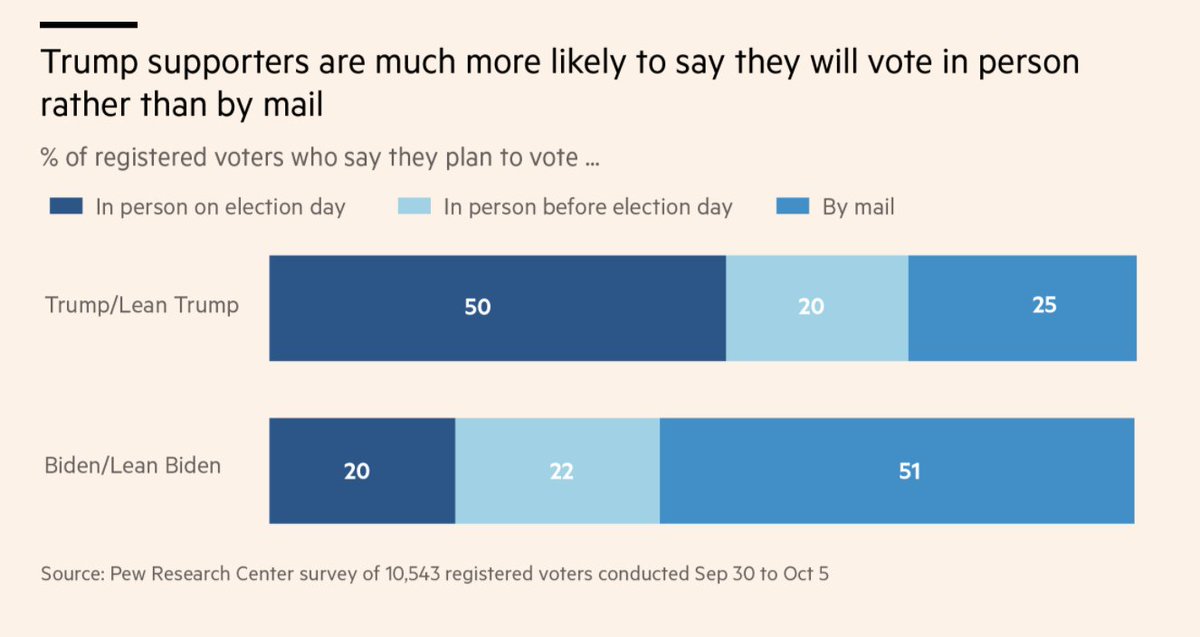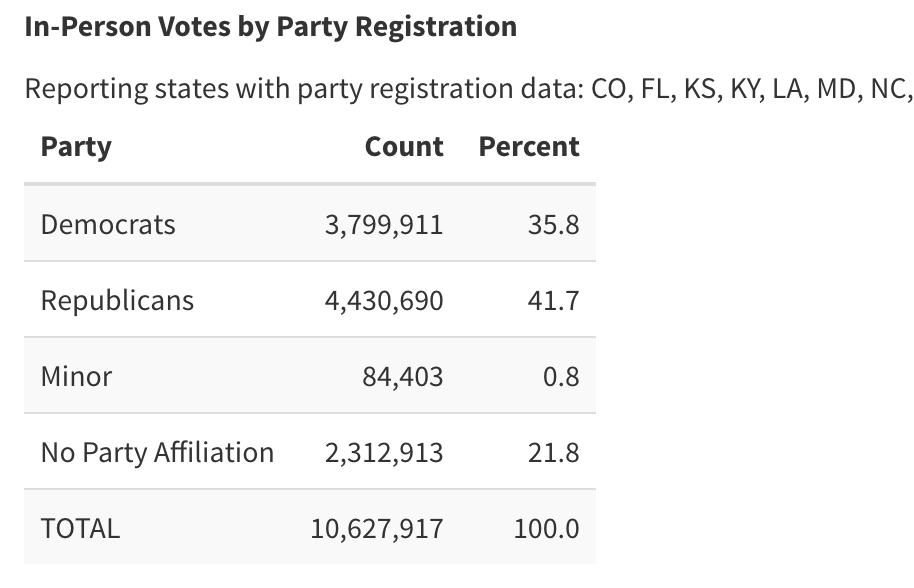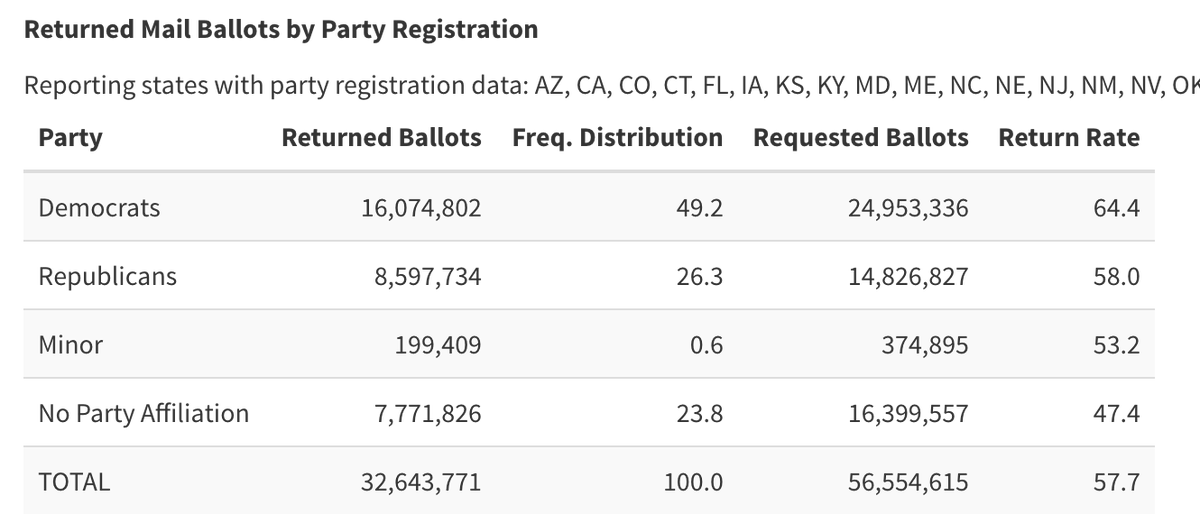A record-breaking 89m Americans (as of this morn) have voted early, and Texas+Hawaii have surpassed their *total* 2016 voting in their early vote *alone*. Other states are on track for this as well ...
Impressive data, but WHAT DOES IT ALL MEAN??
THREAD 1/? https://twitter.com/Dimi/status/1322405256781856768
Impressive data, but WHAT DOES IT ALL MEAN??
THREAD 1/? https://twitter.com/Dimi/status/1322405256781856768
Dems have the early vote advantage in places like Florida, does this mean Trump is in trouble there?
For the most part*, **the early vote alone is not going to tell you who's going to win.**
*will get to this "most part" part late
2/?
For the most part*, **the early vote alone is not going to tell you who's going to win.**
*will get to this "most part" part late
2/?
In 2016, the early vote favored Clinton in FL and NC — Trump won both states.
This year it shouldn't be surprising that Dems have the lead in the mail-in vote in; they've consistently told pollsters they'd vote by mail. Reps have consistently said they'd vote in person.
3/?
This year it shouldn't be surprising that Dems have the lead in the mail-in vote in; they've consistently told pollsters they'd vote by mail. Reps have consistently said they'd vote in person.
3/?
Think about it this way: the most enthusiastic Dems have probably already voted; the most enthusiastic Reps have yet to cast their ballots. Plus, in general, Reps have the lead in *in-person* early voting this yr.
via @ElectProject https://electproject.github.io/Early-Vote-2020G/index.html
4/?
via @ElectProject https://electproject.github.io/Early-Vote-2020G/index.html
4/?
IMPORTANT NOTE: *not every state has party registration* so all of this Dem/Rep data is only for a limited subset
In states like TX & WI, voters do not register with a party. For those, there are private data companies that use voter models to estimate that stuff
5/?
In states like TX & WI, voters do not register with a party. For those, there are private data companies that use voter models to estimate that stuff
5/?
Which can be informative, but this stuff is hard. Also, lots of the firms are Dem/Rep-affiliated, so they have a partisan angle. If u don't trust polls u have to (to a certain extent in some states) trust these companies' models for info on early vote. Either way it's noisy
6/?
6/?
ALSO (even in today's hyper-partisan environment), party registration is a messy proxy for voter behavior. U might have heard ppl say stuff like "party registration is not the same as partisan affiliation" ... here's what that means:
7/?
7/?
First off, ppl don't always vote with their registered party, especially in presidential races
"10% of registered Democrats voted for Donald Trump, while 7% of registered Republicans voted for Hillary Clinton" via @lennybronner from the (C)CES
8/? https://www.washingtonpost.com/politics/2020/10/22/if-joe-biden-loses-it-probably-wont-be-because-an-increase-gop-voter-registration/
"10% of registered Democrats voted for Donald Trump, while 7% of registered Republicans voted for Hillary Clinton" via @lennybronner from the (C)CES
8/? https://www.washingtonpost.com/politics/2020/10/22/if-joe-biden-loses-it-probably-wont-be-because-an-increase-gop-voter-registration/
Actually, just read @lennybronner's story bc it explains this better than I could do on twitter 
Also Rhodes Cook analyzed party reg trends, @Center4Politics https://crystalball.centerforpolitics.org/crystalball/articles/registering-by-party-where-the-democrats-and-republicans-are-ahead/ (Dems had the registration advantage in 6 states Trump won in 16)
9/? https://www.washingtonpost.com/politics/2020/10/22/if-joe-biden-loses-it-probably-wont-be-because-an-increase-gop-voter-registration/

Also Rhodes Cook analyzed party reg trends, @Center4Politics https://crystalball.centerforpolitics.org/crystalball/articles/registering-by-party-where-the-democrats-and-republicans-are-ahead/ (Dems had the registration advantage in 6 states Trump won in 16)
9/? https://www.washingtonpost.com/politics/2020/10/22/if-joe-biden-loses-it-probably-wont-be-because-an-increase-gop-voter-registration/
Relatedly, I made a bubble chart #dataviz for Texas that paints a mixed picture. As @Dimi points out the record early voting numbers for Texas has happened in historically Democratic and historically Republican areas
https://www.ft.com/content/1b6e9d1a-42d9-4b86-bcfd-9a53f0b2646f
10/?
https://www.ft.com/content/1b6e9d1a-42d9-4b86-bcfd-9a53f0b2646f
10/?
Texas is also a special case as
1/ it doesn't have party registration
2/ the high levels of early voting are overwhelmingly coming from *in-person* early voting, NOT mail voting, because in Texas you need a valid excuse to vote by mail (the pandemic is not an excuse)
11/?
1/ it doesn't have party registration
2/ the high levels of early voting are overwhelmingly coming from *in-person* early voting, NOT mail voting, because in Texas you need a valid excuse to vote by mail (the pandemic is not an excuse)
11/?
All that said, voting early means ur vote is "baked in" & as @ElectProject said to @AaronSafir it was in the weeks leading up to the race it was a "tactical advantage" for the Biden campaign
https://twitter.com/AaronSafir/status/1320166318511968259
12/?
https://twitter.com/AaronSafir/status/1320166318511968259
12/?
"They’re refocusing on ppl who they want to vote but haven’t voted yet ... the Trump campaign, meanwhile, has to focus on a larger universe of people that they're trying to get to vote & they’re going to have to wait probably until Election Day to get most of them to vote"
13/?
13/?
More early voting can potentially also be good for pollsters bc at this stage they are using "likely voter screens" to determine who will turn out to vote. More early voting can help pollsters get a better picture of the voting electorate.
14/?
14/?
Then again, bc it is so lopsided this year, pollsters are probably only getting this clarity for Biden voters.
In other words, could vote method be a weight in future pre-election polls?!?!


https://twitter.com/Nate_Cohn/status/1291830370166616068
15/?
In other words, could vote method be a weight in future pre-election polls?!?!



https://twitter.com/Nate_Cohn/status/1291830370166616068
15/?
*I said I'd get back to the point that for the "most part" part when I said the early vote is for the most part not predictive of the outcome
Here's how I see it: there is no “one-size-fits-all” method for making predictions based on the early vote
16/?
Here's how I see it: there is no “one-size-fits-all” method for making predictions based on the early vote
16/?
. @ElectProject has made forecasts in the past but part of it depends on having a “baseline comparable election” for in a given state. The problem with 2020, he has pointed out, is that both the supply and demand of early voting has increased https://electproject.github.io/Early-Vote-2020G/FAQ.html
17/?
17/?
SUPPLY: several states have passed laws to encourage early voting. DEMAND: the pandemic had made ppl see vote-by-mail as a safer option. +Trump’s attacks on mail-in voting & the resulting disproportionately Democratic mail-in turnout - all are confounding factors
18/?
18/?
I feel like I wrote a hell of a thread just nerdily conclude that it's hard to make conclusions from the astounding early vote numbers ...
19/?
19/?
so I'd like to point you to @RalstonReports, who is known for making accurate predictions in NV using early vote. part it is because so many Nevadans—69% in 16—vote early & it has party registration. also, he has covered the state for 3 1/2 decades
20/? https://thenevadaindependent.com/article/the-early-voting-blog-3
20/? https://thenevadaindependent.com/article/the-early-voting-blog-3
finally, if all this sounds confusing to you it's because it is! US election administration is VERY CONFUSING bc every state does it differently:
"Every general statement about how states run elections is false in at least one state" — "Quesenbery's Law" via @cstewartiii
21/fin
"Every general statement about how states run elections is false in at least one state" — "Quesenbery's Law" via @cstewartiii
21/fin
addendum: the Texas dot plot I churned out last nite could have used an annotation or 3 — TX is more competitive now & those counties I labeled red are trending more blue if you look at '18
much deeper analysis via @TexasTribune:
https://www.texastribune.org/2020/10/30/texas-toss-up-voters/ https://twitter.com/darlacameron/status/1322588285697462273?s=20
much deeper analysis via @TexasTribune:
https://www.texastribune.org/2020/10/30/texas-toss-up-voters/ https://twitter.com/darlacameron/status/1322588285697462273?s=20

 Read on Twitter
Read on Twitter







